Previously we looked at Chapters 1 and 2 of “The Inglourious Fugue.” In this post, we’ll look at Chapters 3 and 4, which loosely correspond to Act II in the traditional screenwriting structure. Refer to my intro for a definition of the terms being used here and an outline of how we’re looking at Inglourious Basterds as a fugue.
Chapter 3: German Night in Paris
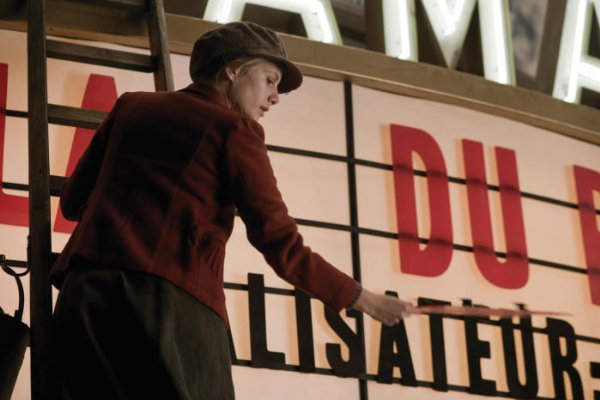 After a great crane shot of the cinema to open the chapter—a trademark Tarantino fetishization—the voice of Shosanna is re-introduced, now in the key of Emmanuelle Mimieux. (QT’s title card tells us that this is four years after the events in Chapter 1, although the dates given—1941 and June of 1944—don’t quite add up.) The cinema serves as Shosanna/Emmanuelle‘s chorus, and we also get a brief introduction to Marcel, her answer. While working on the marquee, Emmanuelle meets Fredrick Zoller, the first voice of the Nazis in this chapter.
After a great crane shot of the cinema to open the chapter—a trademark Tarantino fetishization—the voice of Shosanna is re-introduced, now in the key of Emmanuelle Mimieux. (QT’s title card tells us that this is four years after the events in Chapter 1, although the dates given—1941 and June of 1944—don’t quite add up.) The cinema serves as Shosanna/Emmanuelle‘s chorus, and we also get a brief introduction to Marcel, her answer. While working on the marquee, Emmanuelle meets Fredrick Zoller, the first voice of the Nazis in this chapter.
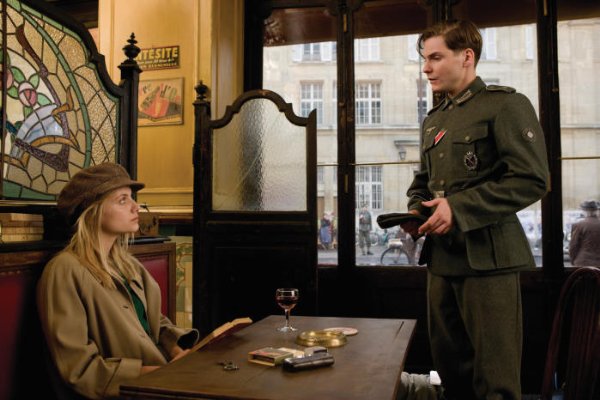 The next day, In the coffee shop, Shosanna again encounters Zoller, and this time his voice overtakes hers and becomes dominant as he expands his subject, showing its full nature (namely, that he is a German war hero, and the star of a new propaganda film about his exploits).
The next day, In the coffee shop, Shosanna again encounters Zoller, and this time his voice overtakes hers and becomes dominant as he expands his subject, showing its full nature (namely, that he is a German war hero, and the star of a new propaganda film about his exploits).
There is another interlude at the cinema, and then Shosanna is taken by some Nazis to a restaurant, where she meets Joseph Goebbels, whose voice is immediately and strongly established with a small racist monologue about American Olympic gold being earned with Negro sweat. 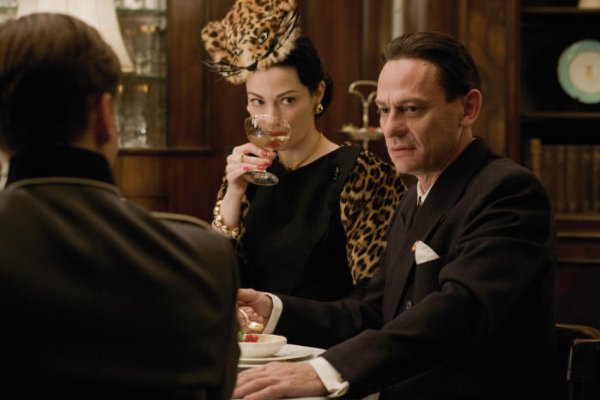 Goebbels and Zoller then play off of each other, their two voices harmonizing as they discuss the premiere, while Shosanna is drowned out. Major Hellstrom also makes an appearance here, briefly foreshadowing his voice, which will become a foreground subject for a time in Chapter 4.
Goebbels and Zoller then play off of each other, their two voices harmonizing as they discuss the premiere, while Shosanna is drowned out. Major Hellstrom also makes an appearance here, briefly foreshadowing his voice, which will become a foreground subject for a time in Chapter 4.
Chapter 3’s Nazi subject peaks when Landa enters and reasserts his voice by ordering a glass of milk for Shosanna, and again when he makes a big show of ordering cream for their strudel, both callbacks to Chapter 1. 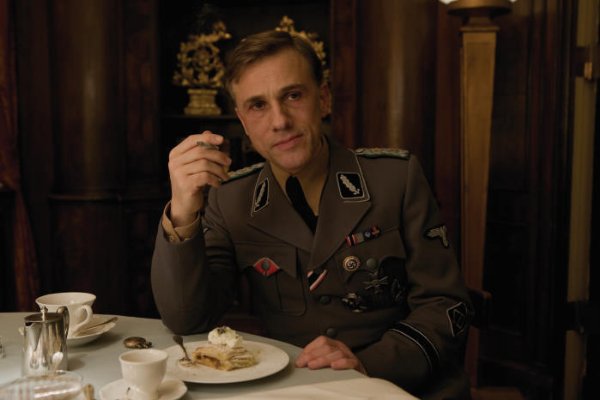 (I love how he attacks his strudel with his fork; it’s a very brief moment, but very effective at foreshadowing the kind of violence he’s personally capable of, which we’ll get to witness first-hand in Chapter 5.) Landa also recapitulates Goebbels‘ racism sub-theme, remarking that being a projectionist would be a good job for “them” (Negroes). This scene is full of tension, with Landa‘s sly smirk and pleasant facade undermining his true nature, which we were witness to in Chapter 1, and contrasting with Shosanna‘s inner struggle to remain calm, which her face almost betrays—Mélanie Laurent is unbelievable in this scene.
(I love how he attacks his strudel with his fork; it’s a very brief moment, but very effective at foreshadowing the kind of violence he’s personally capable of, which we’ll get to witness first-hand in Chapter 5.) Landa also recapitulates Goebbels‘ racism sub-theme, remarking that being a projectionist would be a good job for “them” (Negroes). This scene is full of tension, with Landa‘s sly smirk and pleasant facade undermining his true nature, which we were witness to in Chapter 1, and contrasting with Shosanna‘s inner struggle to remain calm, which her face almost betrays—Mélanie Laurent is unbelievable in this scene.
When Landa finally exits, Shosanna is at last allowed to let out a gasp, releasing the tension that had been established. We then jump to later that night, as Goebbels, Zoller, and a few other Nazis come to check out the cinema. While they’re attending a screening, Shosanna reveals to Marcel her plan to burn it down while the premiere is taking place, setting in motion the first of two assassination plots that will be undertaken in Chapter 5.
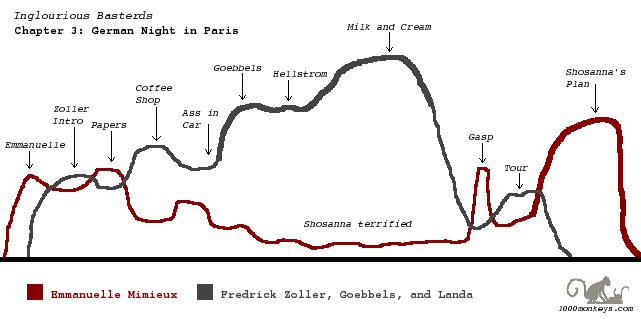
Chapter 4: Operation Kino
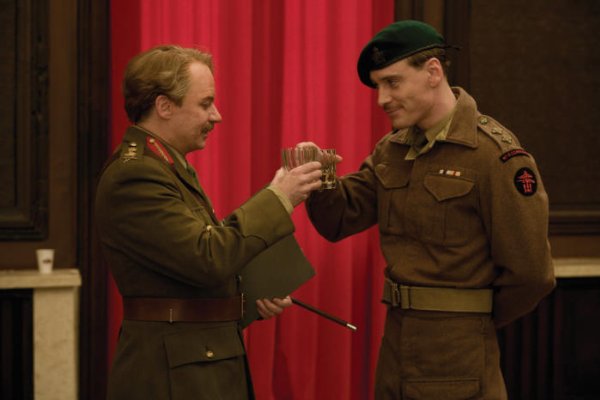 Finally, the fourth and final primary voice is introduced, as Lt. Archie Hicox is recruited by General Ed Fenech to take part in Operation Kino. Outside of the small tavern in the village of Nadine, the Basterds re-state themselves, and begin to harmonize with the voice of Operation Kino as Hicox joins their ranks.
Finally, the fourth and final primary voice is introduced, as Lt. Archie Hicox is recruited by General Ed Fenech to take part in Operation Kino. Outside of the small tavern in the village of Nadine, the Basterds re-state themselves, and begin to harmonize with the voice of Operation Kino as Hicox joins their ranks.
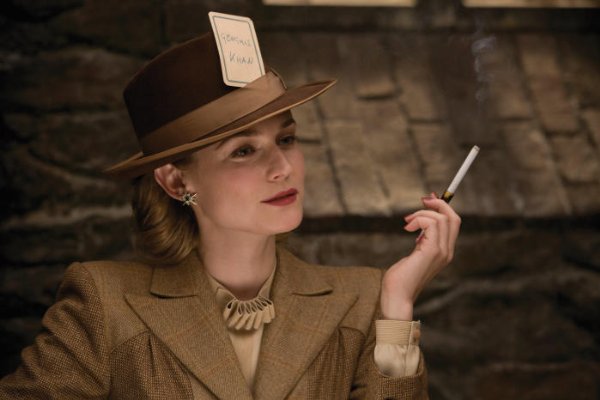 In the basement tavern, we meet Bridget von Hammersmark, who is fraternizing with some Nazis, her countersubject. The Kino–Basterds enter and von Hammersmark joins them. After some more banter, Major Dieter Hellstrom makes his presence known, asserting his voice against the Basterds‘ and von Hammersmark‘s. There is another scene of beneath-the-surface rising tension, much like the one between Landa and Shosanna in Chapter 3, as well as another recapitulation of the racism Nazi sub-theme when Hellstrom conflates “American Negroes” with King Kong. This time, the tension boils over when Hicox gives himself away by holding up the wrong three fingers.
In the basement tavern, we meet Bridget von Hammersmark, who is fraternizing with some Nazis, her countersubject. The Kino–Basterds enter and von Hammersmark joins them. After some more banter, Major Dieter Hellstrom makes his presence known, asserting his voice against the Basterds‘ and von Hammersmark‘s. There is another scene of beneath-the-surface rising tension, much like the one between Landa and Shosanna in Chapter 3, as well as another recapitulation of the racism Nazi sub-theme when Hellstrom conflates “American Negroes” with King Kong. This time, the tension boils over when Hicox gives himself away by holding up the wrong three fingers.
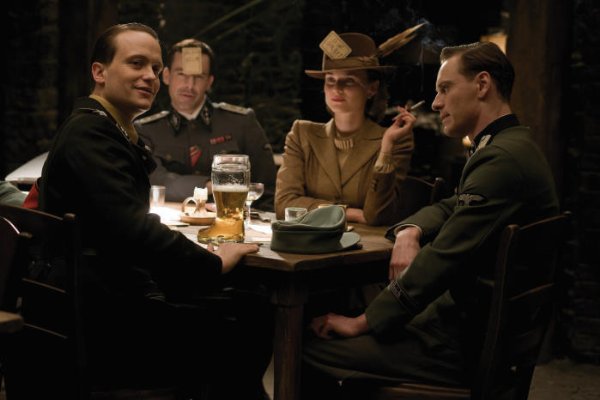 A shoot-out ensues between the Nazis, the Basterds, and Hicox, appearing to leave only Master Sgt. Wilhelm (the new father) alive. Lt. Raine‘s voice enters from the street above, establishing Tarantino’s requisite Mexican standoff (the only one, to my recollection, that is explicitly referred to as such in the film), which is brought to an abrupt resolution when von Hammersmark‘s voice re-asserts itself by shooting Wilhelm.
A shoot-out ensues between the Nazis, the Basterds, and Hicox, appearing to leave only Master Sgt. Wilhelm (the new father) alive. Lt. Raine‘s voice enters from the street above, establishing Tarantino’s requisite Mexican standoff (the only one, to my recollection, that is explicitly referred to as such in the film), which is brought to an abrupt resolution when von Hammersmark‘s voice re-asserts itself by shooting Wilhelm.
The end of Chapter 4 mirrors the end of Chapter 3, with a scene at the veterinarian’s office, where von Hammersmark‘s bullet wound is to be treated, during which the Basterds, along with von Hammersmark, hatch a plan of their own to blow up the cinema on the night of the premiere, as it’s revealed to us that Hitler will be in attendance. Landa‘s voice re-enters briefly in the tavern, where he retrieves the napkin that von Hammersmark had autographed, calling back to his assertion in Chapter 1 that he was a skilled detective.
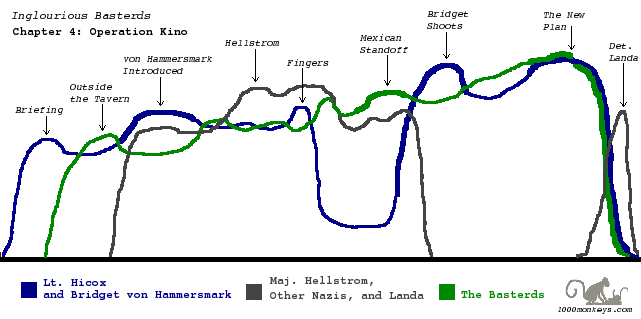
Now the wheels are in motion for a climactic collision of the two separate assassination plots, and the stage is set for Chapter 5, which we’ll get to next.


